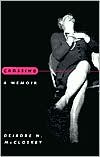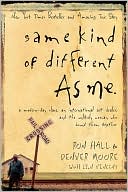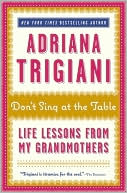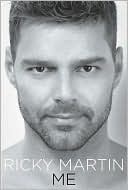Crossing: A Memoir
We have read the stories of those who have "crossed" lines of race and class and culture. But few have written of crossing—completely and entirely—the gender line. Crossing is the story of Deirdre McCloskey (formerly Donald), once a golden boy of conservative economics and a child of 1950s and 1960s privilege, and her dramatic and poignant journey to becoming a woman. McCloskey's account of her painstaking efforts to learn to "be a woman" unearth fundamental questions about gender and...
Search in google:
We have read the stories of those who have "crossed" race lines, class lines, and cultural lines. But few have written of crossing--completely and entirely--the gender line. Deirdre McCloskey, the former Donald, has, and she now tells the dramatic and poignant story of her travel in Crossing, her memoir. A renowned economist and historian, a husband and father, Donald McCloskey had crossdressed for years without wanting more. But rather suddenly, at age 52, a sense that he was denying his real identity grew to the point where he knew he needed to become a woman. Crossing is the story of this realization and its consequences. McCloskey relates in detail the process of physically becoming a woman but also the emotional wake--personal and professional--left by her decision. Her mother accepts her; her children reject her. Some conservative economists prove to be gender libertarians, but some progressive feminists prove to be gender authoritarians. McCloskey's account of her crossing and her painstaking efforts to learn to "be a woman" enfold all the aspects of her journey into fundamental questions about gender and identity, hatreds and anxieties, that have surprising answers. Crossing is the story of a golden boy of conservative economics, a child of 1950s and 1960s privilege, who became a woman. Of necessity she also became an artist performing, and then embodying, gender. She notes that the performance was enacted "often with no audience and seldom with a script." Crossing is the start of an engrossing, terrifying, and uplifting script. It is also an amazing story beautifully told. New York Times Book Review - Maxine Kumin A highly readable, dramatic account.
\ Crossing\ \ \ A Memoir\ \ \ \ By Deirdre N. McCloskey\ \ \ University of Chicago Press\ \ \ \ Copyright © 2003\ \ University of Chicago\ All right reserved.\ \ ISBN: 0-226-55668-9\ \ \ \ \ \ Chapter One\ \ \ Before Deirdre there was Jane\ The big event of that half week was on the way home from the East Coast to\ Iowa City. Donald had arranged to stop in a Chicago suburb for Saturday\ night, going to a motel to meet his crossdressing friend Lucy. Then they\ planned to navigate the parking lot of the motel next door to attend their\ very first crossdressing meeting.\ The meeting was for the Chicago chapter of Tri Ess, the national\ crossdressing sorority, which Donald had joined through his Chicago BBS\ girlfriends. He had been excited for weeks and planned it like a military\ campaign, lugging from Iowa City to Philadelphia to Baltimore to Chicago a\ big suitcase filled with his outfit for the evening and his Philadelphia\ loot. He chose his Marilyn Monroe wig and a black crepe dress inherited\ from his wife.\ Lucy arrived already dressed, and Donald complimented him, as women do:\ "You look great!"\ "I found a cosmetician in my suburb who does makeovers on crossdressers."\ Lucy looked like a suburban housewife, not a drag-show star. Later Donald\ bought some dresses at the woman's store and had a makeoverhimself. The\ cosmetician's youngest son was a drag queen and competed in beauty\ contests.\ Lucy got anxious and wanted to go, and Donald/Jane agreed as he struggled\ into the dress, a little small: "I'll come over when I'm ready. Zip me up,\ will you?" Better to go by myself, he thought. The probability of being\ read rises with the square of the number of crossdressers in a group. (One\ is "read" like a book, detected in the wrong gender.) The man on the\ street reads the least convincing one of a group and then notes that all\ these women seem large.\ Stepping out into the hallway of his motel half an hour later he was\ frightened, imagining detection and the punishment of scorn. On the stairs\ going down, avoiding the elevator with its long looks, he walked by a\ couple coming up, but they didn't appear to read him. Clicking in heels\ around the back of his own motel, he walked into the open toward the other\ one. It was Donald's first time out-of-doors as a woman, apart from a very\ few nighttime walks in empty streets in Princeton and Chicago. It felt\ natural. He hitched up his skirt and leaped over a little stream between\ the two motels, scuttling through the other parking lot in full drag in\ the glare of the late afternoon sun. Still outside, as he approached the\ entrance to the meeting room he encountered a woman: Oh, oh; she'll read\ me. Wait: no. It was another crossdresser on his way to the meeting. Easy\ to read when you're looking for it.\ When Jane came into the meeting room it was filled with crossdressers, and\ his first impression was, These women are huge! They were a third bulkier\ than a roomful of genetic women. It seemed to him that the average\ crossdresser was above average in height. Can't be. (It can, though. If\ there is a deficiency of testosterone in adolescence the bones do not\ close off early in their growth. That's why boys who mature early tend to\ be short and why the castrati playing women's roles with women's voices in\ early opera were unusually tall for men. Not that there's any evidence of\ testosterone deficiency in crossdressers, mind you. Just guys.) Still, the\ clubs ordinarily do not have really big men in them, which makes one\ wonder how the bigger crossdressers and gender crossers are able to\ express themselves. Perhaps in football.\ Most everyone was cordial, though some of the prettier ones seemed snooty.\ Jane later met one of the snooty ones in Atlanta at a conference\ discussion on gender-crossing life for professionals and found him shy and\ uncertain about his future. They all had name tags, and Jane spotted and\ hugged Suzy, one of the BBS friends he had not met in the flesh. Suzy was\ "Susan Roberts," which is to say that in the convention of choosing\ feminine names among crossdressers he was "Bob" as a man. He was tall,\ thin, blond, breaking up with an intolerant wife whom he still loved, and\ struggling with his identity.\ "I went to therapy for two years with my wife," Suzy said.\ "Two years. Did it help?"\ "In a way. We're getting divorced. The therapist finally said to me,\ 'Look: your wife is unable to adjust. Some women can handle it, others\ can't. She has her own reasons.'"\ When the official meeting broke up Jane was standing next to a vivacious\ crossdresser named Robin, a little taller than he was, with a\ Chicago-accented voice. He was brassy, intelligent, extroverted,\ complaining knowingly about the administration of Tri Ess. (Jane learned\ later that it was his first meeting too.) He proposed that he, Jane, Suzy,\ Jane's friend Lucy, and another crossdresser go out on the town. Lucy\ demurred, and the remaining four musketettes set out for a lesbian bar.\ The tougher straight bars are good places to get killed. Gay bars also\ have the undercurrent of lethal violence that is the male condition. The\ lesbians are more civilized and don't mind having crossdressers around,\ regarding them as harmless. The first place was quiet, though enlivened by\ the crossdressers (ten of them, others from the Tri Ess meeting, crowded\ along a set of bar tables like a typing pool out for an after-work drink)\ and then by an ineffectual fistfight between two lesbians in a love\ triangle. Jane danced the way the kids do, by himself, different from the\ lovely paired regularity of square dancing. A butch dyke paired with Jane\ for a while on the dance floor, and Jane gave himself over to ecstasy.\ "Just dance!" the dyke said, "Don't come on to me." When he had to go to\ the bathroom Jane had the others take a picture of Suzy and him outside\ the "first ladies' room." Pictures are big among crossdressers. How many\ crossdressers does it take to go the ladies' room? One hundred: one to go\ and ninety-nine to take pictures.\ They went to a much hotter lesbian bar called Temptations on Grand Avenue\ in the Chicago suburbs. It was in a strip mall next to a tire store, and\ when the stars came out it glittered. Robin had been to the place before,\ as everyone else had too. They regarded Jane as bold to go with the girls\ barhopping on her first night out. What made Jane run? Square dancer,\ middle-aged college professor, father of two, thirty years married, pillar\ of the community shook to the beat of the drum with a hundred others of\ assorted genders and sexual preferences. The cool dance the kids were\ performing turned out to be steps that Donald had learned the year before\ at a square dance in Iowa City. The company was diverting, and each set\ was long.\ Robin introduced Jane to a lesbian sitting at a little table crowded with\ others. She looked like a suburban woman. Kids. Van. She was in her\ forties, dressed butch but not too. Acceptable in the mall. Though women\ can get away with more.\ "I was married and have grown children," she told Jane. "I only figured\ this out a few years ago."\ "How have they adjusted? I mean your family?" Jane was always interviewing\ people, gathering data like some sort of anthropologist, an anthropologist\ who could go native.\ "Poorly." It was not unusual news. In the gay and lesbian community, Jane\ read later, they spoke of 80 percent: 80 percent of your family and\ friends eventually adjust, perhaps after years of rejection, and go on\ loving you after a fashion. That leaves 20 percent. As they talked about\ rejection and acceptance Jane warmed to her, and he found himself flirting\ as the femme. They danced for a while to the throbbing music, then she\ bought Jane a beer. In his three later visits to Temptations Jane looked\ for her, a regular it was said, but never saw her. Jane/Donald was still\ unclear about his preferences. Gender crossing is a matter of identity,\ not affectual preferences. A third of post-op transsexuals go on loving\ women, he would remind himself out of his new learning. Not that I'm a\ transsexual.\ He went to Temptations only those three more times. Chicago is 240 miles\ from Iowa City. (Deirdre would explain to Dutch people where Iowa City\ was: "Near Chicago." Oh, how far? they would ask, supposing she meant 50\ kilometers. "It's 500 kilometers due west, as far as Amsterdam is west of\ Berlin. Not too far.") Donald never did go to similar places closer to\ home. Fear, security, the closet.\ Robin said later that he was struck that first time by Donald's reaction\ as Jane to the unbuttoned scene. Jane came up to Robin and gushed, "Lord,\ I just love this!" The gushing seemed to Robin significant, signaling more\ than a guy in a dress. Robin was coming to terms with his own gender\ crossing and went full time the next month, just before Donald's dam\ broke. Robin had the operation in Montreal a couple of months after\ Deirdre had it in Australia. Deirdre called Robin afterwards and they\ talked about how they just loved this.\ He got back to the motel room at 3:00 a.m. and had a 10:00 a.m. flight\ home. That afternoon in Iowa he was teaching business economics in his\ macho, I'm in charge style. As men brag about their little exploits, he\ dropped hints to the kids about his wild night at a bar in Chicago. He\ left out the detail that he had danced through it in a cocktail dress.\ He went to the first meeting of his local club, Iowa Artistry, thrilled\ and frightened. The meeting was held in a big motel out by the interstate.\ He was pleased to drive across town dressed-This is how it feels to be a\ woman-but nervous about coming into the motel as Jane. In fact respectable\ motels are cordial to crossdressers, because they are good customers.\ Aside from makeup on the towels, they are no trouble. They don't drink\ much, and they don't do sex or violence.\ Iowa Artistry was forthrightly Iowan. The meeting was like a Kiwanis Club\ in drag, with reports from the treasurer and mild quarrels about\ governance. Jane had long, earnest talks about living with crossdressing.\ His attention was held by a thirty-something gender crosser named Anna who\ worked as a technician in a corporation south of Iowa City. She had been\ full time for a year and had finished electrolysis on her beard down in\ Dallas, which he quizzed her about. She was intelligent and sympathetic,\ once married, kids. Donald was deliberating, unaware. But of course I am a\ heterosexual crossdresser. Just wondering.\ Donald's wife dreaded people's finding out and was appalled that after the\ meeting a group of fifteen or so went on to a local bowling alley. Nothing\ happened, no one found out. One attempt at rolling the ball left\ Donald/Jane's false thumbnail halfway down the alley, and he had to walk\ out to retrieve it, amused and embarrassed. He watched closely another\ crosser, very effeminate. She was there with her male lover, the two\ making an ordinary husband and wife. Three years later she had her\ operation and they were legally married. She worked as a telephone\ operator. The daily practice and her determination had made her voice\ good. The heterosexual crossdressers, by contrast, were breezily male in\ their voice and behavior. Jane didn't think much about where he fit in.\ There was only one other group in the bowling alley, at the opposite end.\ Eventually one of them came over to see what was going on, and a\ crossdresser replied with a smile that they were a "mixed league" of\ bowlers-a man and a woman in the same body. When crossdressers meet\ straight people in a group it works fine. Crossdressers call it "gender\ education."\ (Continues...)\ \ \ \ \ \ \ \ \ Excerpted from Crossing\ by Deirdre N. McCloskey\ Copyright © 2003 by University of Chicago.\ Excerpted by permission.\ All rights reserved. No part of this excerpt may be reproduced or reprinted without permission in writing from the publisher.\ Excerpts are provided by Dial-A-Book Inc. solely for the personal use of visitors to this web site.\ \
Part 1: Doubt 1. Boy to Man 2. Marriage 3. Internet, 1995 4. Professor Dressed 5. Clubs 6. In the Ladies' Room 7. Boldness 8. Epiphany 9. Losing Family 10. Academic Drag 11. A Day You Feel Pretty 12. Premarin 13. Sweet October Part 2: Struggle 14. Outed 15. "Welcome" 16. The Cuckoo's Nest 17.Hearing? 18. Then Why Are You Doing This? 19. Chicago 20. Changing 21. Sister's Last 22. Professional Girl Economist 23. Farewell Speech 24. Dutch Welcome 25. The Worst Days in February 26. Passing 27. Yes, Ma'am Part 3: Across 28. Vriendinnetjes 29. Women's World 30. To Make Up for God's Neglect 31. Merry May 32. Starting 33. Finishing 34. A Post-Menopausal Woman on Hormone Therapy 35. Facelift 36. This Is How We Live 37. Dutch Winter, 1996 38. Going Home 39. Costs 40. Iowa Drag 41. Professora Traveling 42. Second Voice 43. Makeup 44. Getting There 45. Differences 46. Christ's Mass 1997
\ Maxine KuminA highly readable, dramatic account. \ — New York Times Book Review\ \ \ \ \ Publishers Weekly - Publisher's Weekly\ Transsexuality has fascinated mainstream readers since 1953, when former U.S. serviceman George Jorgensen went to Sweden and, to banner headlines, returned as Christine. Since then, there has been a string of notable memoirs of gender crossing, including Geoff Brown's sincere I Want What I Want (1966), Jan Morris's meditative Conundrum (1974) and Holly Woodlawn's campy A Low Life in High Heels (1994). McCloskey's own odyssey from Donald to Deirdre is closest to noted journalist Morris's, in that it charts the life change of a highly regarded public figure--McCloskey is a world-famous conservative economist--who finds fulfillment as a woman after four decades of living as a man. McCloskey forthrightly describes her upper-middle-class youth in Boston, her early and lifelong interest in cross-dressing, her education and eventual success as an academic and her marriage and children. In her late 40s, McCloskey decided that she was not simply a heterosexual cross-dresser but a transsexual and decided to undergo a series of operations to become an anatomical woman. Her memoir effectively details the pain involved: a bitter divorce, insurance companies' refusal to cover surgeries and her sister's repeated attempts to block the process legally. McCloskey's proclivity to jump around in time, her tendency to disrupt the flow of her story with social and political digressions and the constant placing of additional thoughts and ideas in bold text throughout the narrative distract from her story--but her courage nevertheless shines through. (Nov.) Copyright 1999 Cahners Business Information.\ \ \ Library JournalMcCloskey, married for 30 years, the father of two, and an economics and history professor, was a secret cross-dresser for 41 years, as "Jane." At 52, he realized that his real identity was as a woman and began transitioning as "Dee" to become "Deirdre." At the heart of this fascinating and poignant story, told in the third person, are the two years (one in Holland) of hormones, multiple surgeries, electrolysis, and a legal name change, all part of the physical and emotional "crossing" from male to female. The big-boned Deirdre describes the joy of "passing," the fear of being "read," and the occasional loving support she has received in contrast to painful estrangement from family, friends, and colleagues. At times revealing, humorous, and provocative, this often overwrought and self-righteous book is marred by minor mistakes, includes gross generalizations about gender differences, and inconsistently employs italicized bold type to represent internal thoughts. For larger public and academic libraries.--James E. Van Buskirk, San Francisco P.L. Copyright 1999 Cahners Business Information.\ \ \ \ \ BooknewsSome conservative economists proved to be gender libertarians, whereas some feminists proved to be gender authoritarians. So Donald McCloskey (economics, U. of Iowa) found out when the married father sought his true gender identity as Deirdre. Includes b&w photos of stages in the transition. Annotation c. Book News, Inc., Portland, OR (booknews.com)\ \ \ \ \ Kate BornsteinDeirdre McCloskey's brave, witty, dizzying autobiography positively drips tears, sex, danger, and courage with each sashaying step.\ \ \ \ \ Peter SkinnerDeirde McCloskey tells a searing tale of the traumas and rewards of gender change. This book is a powerful indictment of legal, medical and institutional obstruction to gender change. \ — ForeWord\ \ \ \ \ Kirkus ReviewsA testimony to her struggles and courage, Crossing invites the reader to enter Deirdre (formerly Donald) McCloskey's mind as she decides to become a woman after a lifetime as a man, husband, and father. A renowned professor of economics at the University of Iowa, Donald McCloskey had to fight tenaciously to realize his inner call to become a woman against such foes as his sister (who had him repeatedly committed against his will for psychiatric evaluations) and his marriage family (who, in the book's most heart-wrenching scenes, renounce their father and former husband). Mixed with this trauma, however, is McCloskey's blossoming sense of self and her discovery of a true community of friends who love her for the woman she is, not the man she was. The cantankerous halls of academe provide the setting for many of the memoir's intriguing political debates: feminists argue that McCloskey is not a women and therefore should not join female faculty groups; conservative economists accept McCloskey's new self with libertarian nonchalance. Oddly enough, though, McCloskey's views of gender seem to become more strongly reified through her experiences. Men are combative; women nurturing. Men barter for gain; women give for comfort. One is left wondering how a woman brave enough to undergo the tribulations of losing a family and to face the possibility of professional contumely could have emerged from a man so self-parodically timid of his femininity that he could not bring himself to describe his car as "dark blue, with cream trim." This Trojan horse of a memoir approaches under the guise of sexual equity yet closes with gender stereotypes still firmly entrenched. Crossing remains a tribute tothe power of resisting society in order to realize personal fulfillment, but McCloskey would have done so with a more incisive voice if she did not seem to believe so strongly in the many gender stereotypes she attempts to undermine. (10 halftones)\ \








